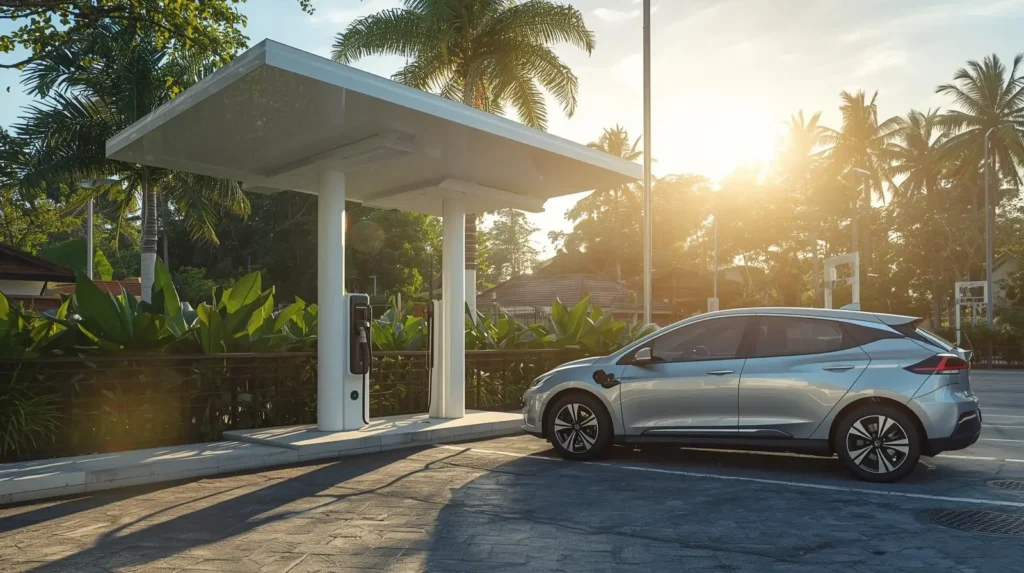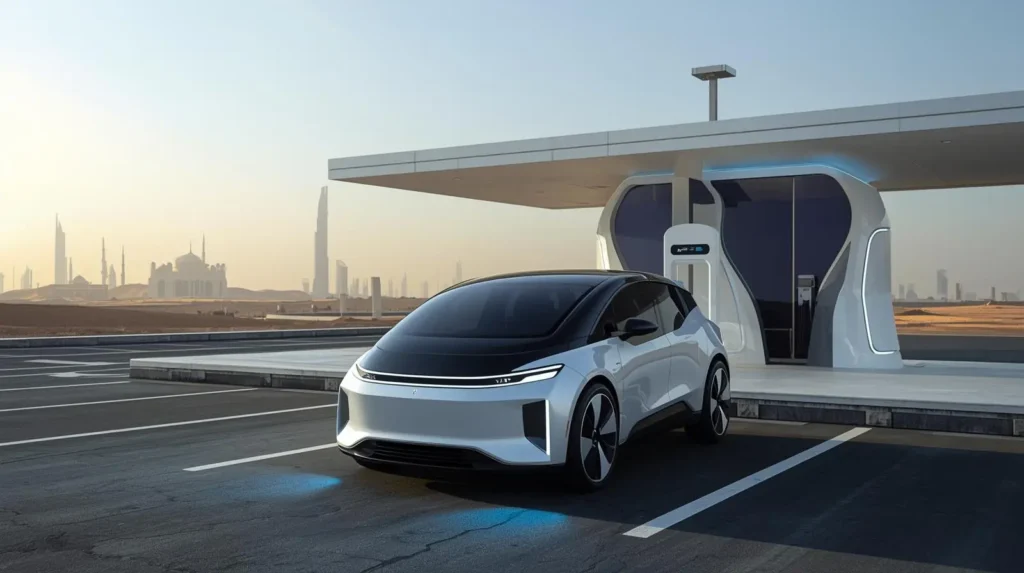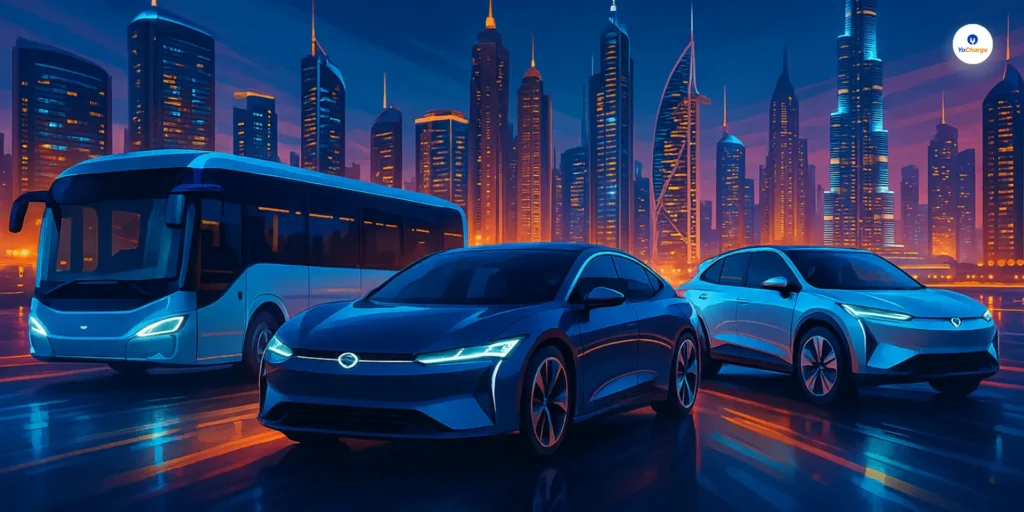
Debunking Electric Vehicle Myths: With the rise in environmental awareness and the push toward cleaner energy, electric vehicles (EVs) are increasingly becoming a popular choice for consumers.
However, electric vehicle myths have caused some hesitation among buyers. From concerns about the cost to doubts about range, many myths persist to be debunked.
Table of Contents
Debunking Top Electric Vehicles Myths
In this article, we will debunk nine common electric vehicle myths and show why EVs are a smart, sustainable choice for the future of transportation.
Electric Vehicle Myth 1: Electric Vehicles Are Uneconomical
Fact: Electric vehicles are more economical when you consider fuel and maintenance costs.
One of the most common electric vehicle myths is that they are too expensive to buy and maintain. While it is true that the initial purchase price of an EV might be higher than a traditional gasoline-powered car, this cost is quickly offset by significant savings on fuel and maintenance.
- Fuel savings: EVs don’t rely on gasoline; electricity is typically cheaper.
- Maintenance savings: EVs have fewer moving parts, which means less wear and tear, resulting in lower maintenance costs.
In addition, governments around the world are offering subsidies and incentives to reduce the initial cost of buying electric vehicles, making them more affordable.
Electric Vehicle Myth 2: It Takes Too Long to Charge an Electric Vehicle
Fact: Fast charging options are available, and most cars charge while parked.
Many people believe electric cars take too long to charge, but it is again an electric vehicle myths, the reality is quite different. Most cars spend over 90% of the time parked, which gives you plenty of opportunities to charge your EV at home.
- Home charging: Simply plug in your car overnight, and it’s ready by morning.
- Fast charging stations: Public fast chargers are becoming more widespread, and many can charge an EV from 20% to 80% in just 30 minutes.
- Charger types: Slow/moderate chargers take 1–5 hours for an 80% charge, while fast chargers can complete the job in less than an hour, especially for electric cars with larger batteries.
Electric Vehicle Myth 3: Electric Vehicle Batteries Will Only Last a Few Years
Fact: Electric vehicle batteries are designed to last for several years.
Among the most pervasive electric car myths is the idea that EV batteries will only last a few years, like the batteries in smartphones. The truth is that EV batteries are designed for longevity.
- Battery warranties: Most EV manufacturers offer warranties of 5 to 8 years on their batteries.
- Energy storage: Even when a battery has aged, it can often be repurposed for energy storage, extending its useful life beyond the vehicle.
Electric Vehicle Myth 4: Electric Vehicles Have More Emissions Than Gasoline Cars
Fact: EVs have a smaller carbon footprint than gasoline cars, even when accounting for battery manufacturing.
A common myth about electric vehicles is that they are worse for the environment due to the emissions from battery manufacturing and electricity generation. However, EVs are far more efficient at converting energy into motion compared to gasoline cars.
- Efficiency: EVs convert 59%–62% of electrical energy into movement, while gasoline vehicles convert only 17%–21% of fuel into power at the wheels.
- Cleaner grid: As the energy grid becomes greener with more renewable sources, the environmental benefits of EVs will continue to grow.
Electric Vehicle Myth 5: Electric Vehicles Have Low Range
Fact: Modern EVs have more than enough range for the average driver’s daily needs.
Range anxiety is another significant concern fueling electric vehicle myths. People fear they will be stranded far from an EV charging station. However, EV ranges are improving, and they are more than sufficient for daily use.
- Two-wheelers: The average range of electric two-wheelers is around 84 km per charge.
- Electric cars: Most electric cars offer a range of 150–200 km per charge, which is ample for typical daily travel. The expanding network of public charging stations further alleviates concerns about range, even for longer journeys.
Electric Vehicle Myth 6: Electric Vehicles Are Slow and Perform Poorly
Fact: Electric vehicles often outperform gasoline cars in terms of speed and acceleration.
There is a lingering myth about electric cars being slow, but in reality, many EVs offer superior performance compared to traditional vehicles.
- Instant torque: EVs deliver torque instantly, providing quicker acceleration than gasoline-powered cars.
- Smooth ride: Without the need for gears, EVs offer a smooth, uninterrupted ride.
EVs are increasingly being designed with high-performance capabilities, making them just as fast or faster than conventional cars.
Electric Vehicle Myth 7: India’s Electricity Grid Can’t Support Electric Vehicles
Fact: The grid is improving, and EVs will reduce life-cycle carbon emissions even now.
Some believe that India’s power grid is not ready for a surge in electric vehicle use. But in fact, India is investing heavily in renewable energy, which will make EV charging even cleaner.
- Renewable targets: India aims for 175 GW of renewable energy capacity by 2022 and 450 GW by 2030.
- Current emissions: The national grid’s weighted average emission factor remains constant at 0.82 tCO2 / MWh, meaning even now, EVs are more environmentally friendly than gasoline cars.
Electric Vehicle Myth 8: There Are Not Enough Charging Stations in India
Fact: India’s charging infrastructure is growing rapidly, with over 900 stations already in place.
Another popular myth about electric vehicles is that there are not enough charging stations available, making EVs impractical for long journeys. However, the infrastructure is growing quickly.
- Public charging stations: India currently has 934 public charging stations, with more being added regularly.
- Government initiatives: The Ministry of Power mandates charging stations every 25 km along highways and 3 km within cities.
- Private chargers: Many EV owners install home chargers, making daily charging simple and convenient.
Electric Vehicle Myth 9: Electric Vehicles Are Dangerous in Waterlogged Areas or Rain
Fact: Electric vehicles are built with water ingress protection and are safe in wet conditions.
People often worry that electric cars will malfunction or be dangerous when driving through waterlogged areas or charging in the rain. However, this is one of the electric car myths that is far from the truth.
- Ingress protection: Most EVs come with an IP67 rating or higher, meaning they are protected against both dust and water.
- Safety standards: As long as the vehicle is undamaged, it will not conduct electricity in wet conditions.
Conclusion
As the world moves toward cleaner energy, it is essential to dispel common electric vehicle myths. EVs are more economical, environmentally friendly, and efficient than ever before. With the range, performance, and charging infrastructure improving, it’s clear that many of the myths about electric vehicles are based on outdated information.
Electric vehicles are poised to become the future of transportation, and understanding the facts is the first step toward embracing that future.



